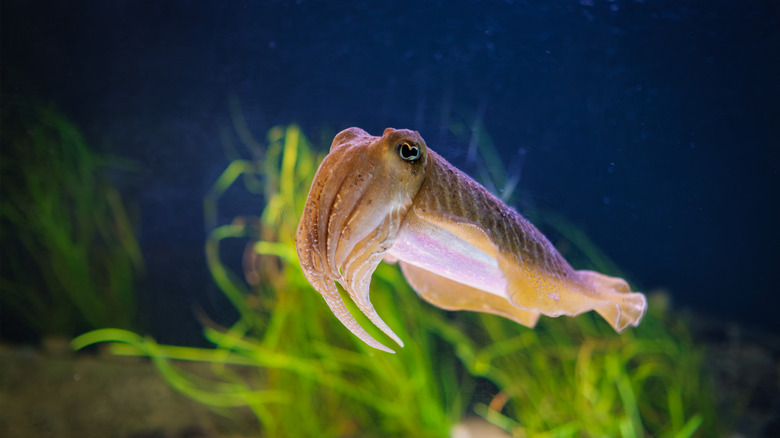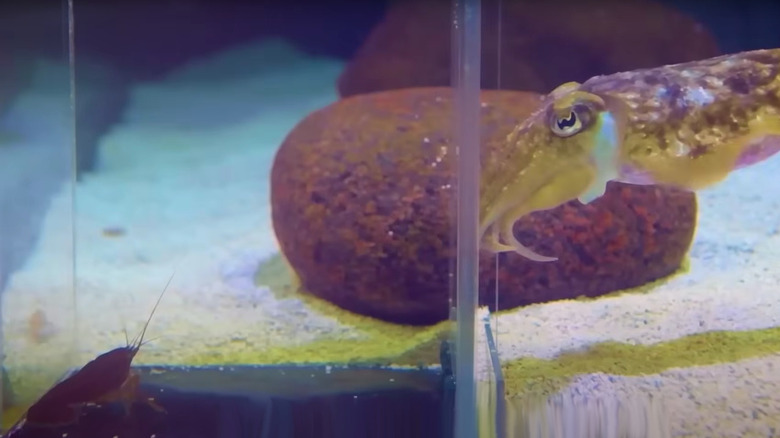Scientists Gave Cephalopods A Cognitive Test (And They Passed)
Many animals are smarter than you might think — chimps, dolphins, ravens, and elephants, to name a few; because such creatures are vertebrates, they share many genes with humans, so it makes sense that they'd be clever, too. Vertebrates emerged around 500 to 600 million years ago, and in the half a billion years since, vertebrates and invertebrates evolved separately and developed distinct nervous systems. In a sense, to human beings, invertebrates are aliens. That's why when one invertebrate species passed a cognitive test designed for humans, it was a shocking achievement.
In a 2021 study published in Proceedings of the Royal Society B, Cambridge researchers applied the "marshmallow test" to cuttlefish to test their capacity for self-control. It was based on the original Stanford Marshmallow Test, an experiment designed in the 1970s in which human children were offered a choice: receive a single marshmallow immediately or wait 15 minutes and receive two. Early trials showed that children who waited were more likely to achieve greater academic success later in life. In other words, self-control was a sign of intelligence. Later research found holes in the original methodology, but the marshmallow test still became a landmark in the study of cognition.
To test it on cuttlefish, the Cambridge researchers followed the same principles but adapted the experiment to accommodate animals that live in aquatic habitats. Rather than marshmallows, they used prawns and shrimp; rather than given verbal instructions, the cuttlefish were trained to follow symbolic instructions. Even with the modifications, the experiment's results were surprisingly similar to those of the original Stanford experiment: cuttlefish with greater self-control also had higher success rates on learning tasks. According to the study's lead author, Alexandra Schnell, the cuttlefish's performance was "comparable to what we see in large-brained vertebrates such as chimpanzees" (via The University of Chicago Marine Biological Laboratory). It seems cuttlefish aren't quite so alien after all.
How to give cuttlefish a test designed for humans
The 2021 study wasn't the first time that cuttlefish passed the marshmallow test: A 2020 study also demonstrated how cephalopods can practice self-control. The researchers first offered the cuttlefish a choice between crab and shrimp to determine which was the favorite, and all 29 preferred the shrimp. The researchers then trained one group to expect a strict feeding schedule, with crab for breakfast and shrimp for dinner. The cuttlefish soon began to "fast" in the morning to save room for the much tastier shrimp dinner. Such behavior is called delayed gratification, and it's one of the traits that cognitive scientists link to higher intelligence.
But because the 2020 experiment left room for other explanations for the cuttlefish's behavior, Alexandra Schnell and her colleagues decided to refine the test even further. First, they trained the cuttlefish to associate different symbols with different timers; transparent food containers with circle symbols opened immediately, while those with triangles had a delay. Then, they placed a piece of a dead prawn in the circle-marked container and a live shrimp (a cuttlefish favorite) behind the triangle-marked container. If the cuttlefish went for the prawn, the shrimp container would lock shut permanently.
Surprisingly, the cuttlefish didn't have to learn by trial and error to figure out how they could get to the tasty shrimp. Having already been trained to recognize that the triangle symbol meant "wait," all six of the cuttlefish in the test group knew to wait, though some were more patient than others. The "star students" resisted the temptation for as long as 130 seconds, and they were also the same individuals that excelled in follow-up learning tasks. Such cognitive parallels between humans and cuttlefish are striking — even if we prefer marshmallows over live shrimp.

